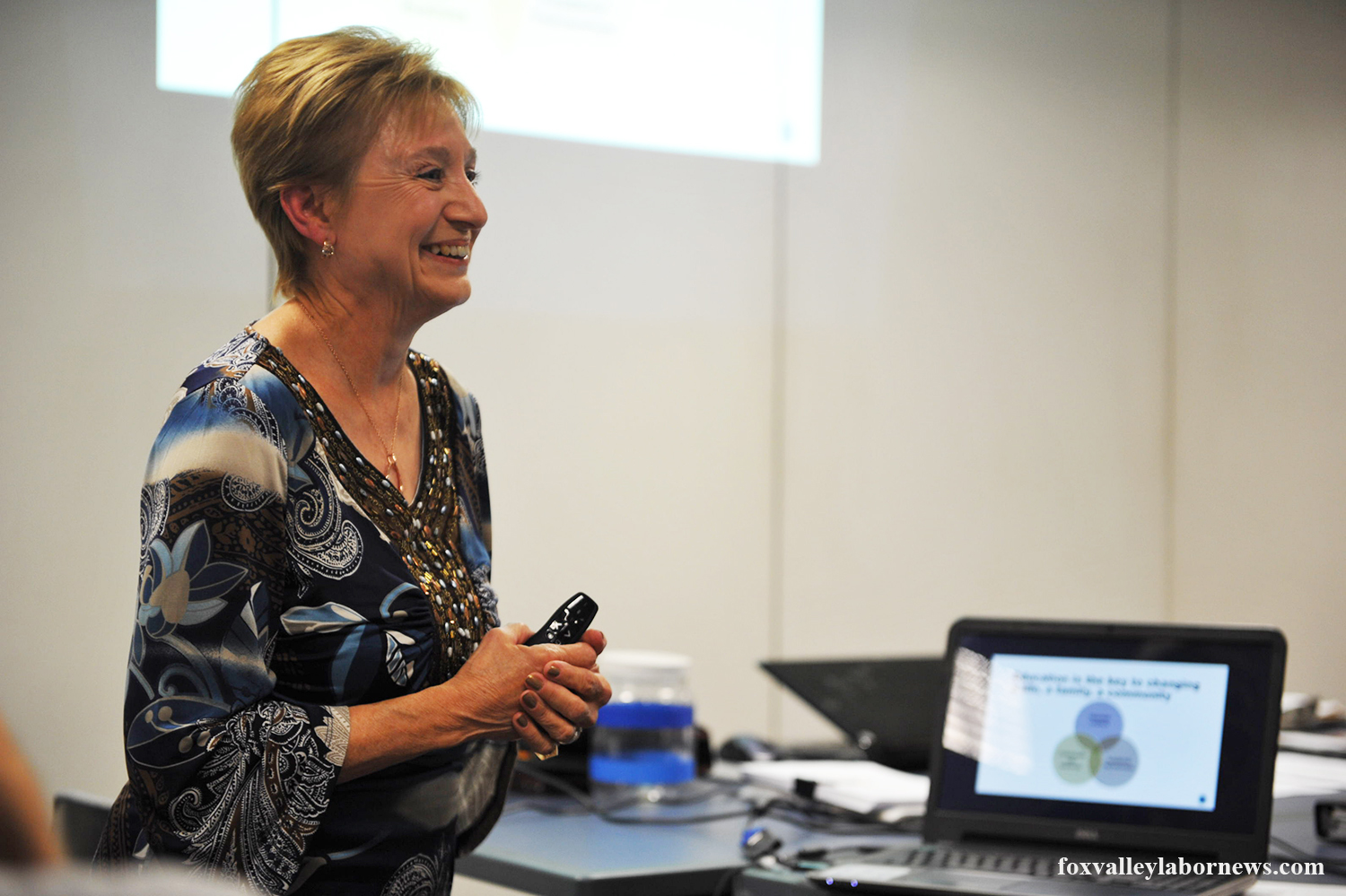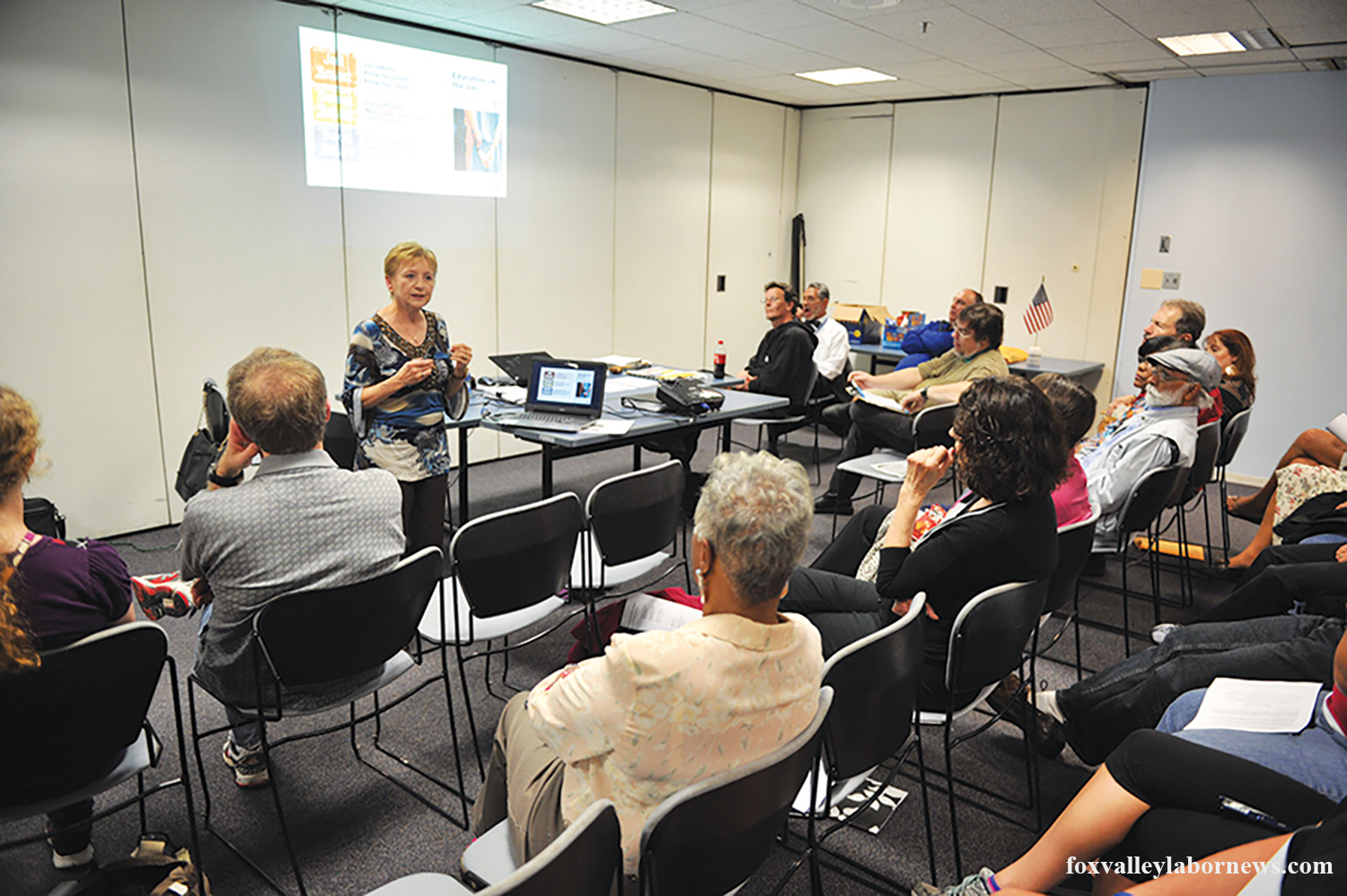
Dr. Susan Neustrom had an opportunity to create an educational outreach model for inmates of the DuPage County Jail. Unfortunately, before the model could move forward, the plug was pulled. Pat Barcas/staff photographer

By Pat Barcas
Staff Writer
Thursday, Oct. 2, 2014
Email Pat Barcas at pat@foxvalleylabornews.com
NAPERVILLE — Dr. Susan Neustrom went down the rabbit hole of the prison system when she spent three years at the DuPage County Jail as executive director of JUST of DuPage (Justice, Understanding, Service, Teaching), a nonprofit organization that aims to reduce recidivism rates through education and other programs.
What she found while working there bothered her — and she shared the hopeless feeling of many of the inmates as her feasibility study on how to educate them for a brighter future was scrapped without warning in August of 2013.
“I never thought I’d be talking about this, but now I can’t stop talking about it,” she said as she shared information Sept. 25 at the Naperville Township Democratic Organization meeting. “My study was outlined clearly, it was approved, I had a start day. Then it was canceled.”
As she interacted with inmates, guards and administration, she designed a model of adult education services with the goal of having inmates exit the correctional system, increase job prospects, and positively contribute to society.
What she found was a lack of education, unstructured programs, numerous limitations, challenges, and obstacles, an inconsistency of program delivery, and very little communication with jail administration. The existing programs on the inside, she found, were just busy work, and not connected to the outside world.
“Jail is the most dismal place you’ve ever seen. Many days, I wondered who was incarcerated,” she said.
Neustrom said she was able to penetrate the mysteries of the jail while working there and got some very difficult to obtain statistics during 2012.
The turnover rate in one month can be as much as half of those entering and leaving a state or federal prison annually. About 35 inmates are booked daily, and nearly as many are released. Once sentenced, an inmate can only stay for 364 days, but can await sentencing for months or even years — one inmate was there for six years while Neustrom worked there, awaiting trial.
“The female population is rising, and the recidivism rates in DuPage are also rising. It’s alarming,” she said. “Formerly incarcerated fathers are less likely to provide for their families because they can’t find employment. How can they change their pattern if jobs are not available? This breeds marital strain, aggression, and depression, which leads to more crime. Incarceration is not the problem, it’s a symptom of a much larger problem. Most inmates are victims and have been most of their lives.”
To turn this around, she said the only answer is education.
“It’s a life changer. It changes individuals, families, and communities. Inmates are darn smart, they want to better their lives, their situation. They want an education and job training,” said Neustrom.

Members of Naperville Township Democratic Organization and guest discuss Dr. Susan Neustrom’s conclusions after she spent three years observing the workings at the DuPage County Jail. Pat Barcas/staff photographer
Her pilot program was to be a very small scale, six month study to collect data on an effective way to educate inmates, with the goal of decreasing recidivism and creating a positive learning environment. It was fully funded and approved.
As she was about to begin her work as a contractor at the prison, the sheriff stopped it without a hint of warning.
“There was no reason, no answers, and no feedback. I’m not surprised,” she said.
Tony Michelassi, district 5 DuPage County Board member, attended Thursday night’s meeting and expressed anger that the pilot program never before the DuPage County Board.
“I’m outraged that this didn’t even see the light of day at the county board. I never heard about it. It never got a hearing in front of the Judicial Public Safety Committee. This is something that we should have been apprised of, because I’m pretty sure there would be an attitude on the county board that would support it,” said Michelassi, who started on the County Board in 2008.
He said in his first year of service, he received numerous memos from the sheriff’s department saying the jail was running at or near capacity, and more funding needed to be approved.
“Instead of trying to lobby us for more money to construct an additional portion to our jail, I think the sheriff should be lobbying us for more money for education programs to lower the incarceration rate in the first place,” said Michelassi.
Neustrom said a senior jail administrator had told her before that DuPage County used to be innovative, but now smaller counties were passing the jail up.
“We had begun a solution, which was important, but it was stopped. As of this day, it sits there, and it’s sad,” she said.
